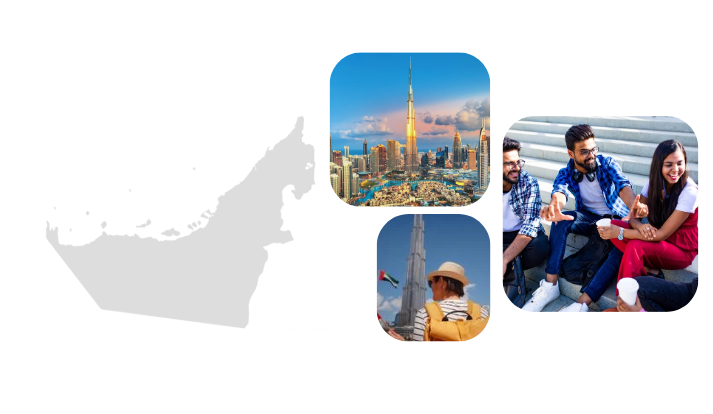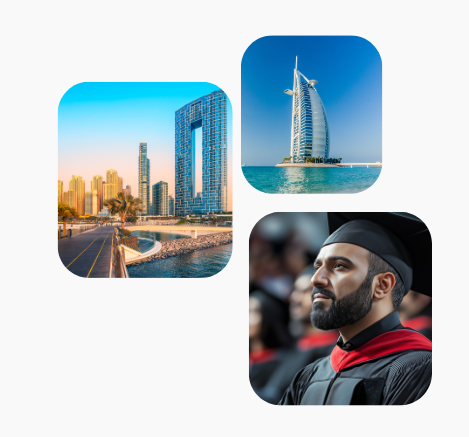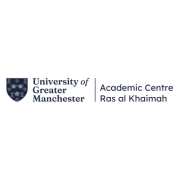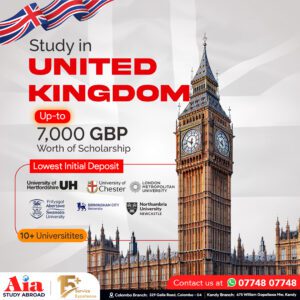Why Study in UAE?
The United Arab Emirates (UAE) is a rapidly growing hub for education, offering worldclass universities, cutting-edge facilities, and a multicultural environment. Known for its innovation and economic dynamism, the UAE provides degrees in fields like business, engineering, IT, hospitality, and healthcare. With affordable tuition, safety, and abundant internship opportunities, the UAE is an ideal destination for international students. Its location at the crossroads of Europe, Asia, and Africa further enhances its appeal for global learners. AIA supports students from university selection to visa processes and settling in.

Key Facts to Study in the UAE
Language Spoken
Arabic and English
Cost of Study
AED 37,000 – 70,000 per year
Exams Required
IELTS, TOEFL, or EmSAT
Degrees
Diploma, Bachelor’s, Master’s, and PhD
Intakes
September (Main), January, and April
Best Cities
Dubai, Abu Dhabi, Sharjah, and Ajman
Our Partnered UAE Universities
AIA Study Abroad Partnered up with 50+ UAE Top ranked universities, to choose from
Scholarships
Students can reduce the financial burden with these scholarship opportunities:
Get Free Expert Assistance
| INTAKES AND DEADLINES | |
|---|---|
| September Intake (Main) | Apply by February–June |
| January Intake | Apply by September–November |
| April Intake | Apply by January–March |
Cost of Study in UAE
AED 3,000 – 6,000 per month, depending on the city and lifestyle.
Undergraduate Degrees:
Tuition fees range fromAED 37,000 – 70,000 per year
Postgraduate Degrees:
Tuition fees range from AED 55,000 – 90,000 per year.
Living Costs:
Dubai and Abu Dhabi: AED 4,000 – 6,000 per month for accommodation, food, and transport.
Rest of UAE: AED 3,000 – 4,500 per month
| Type of Expense | Cost(Annual Average) |
|---|---|
| Tuition Fees | AED 37,000 – 70,000 |
| Accommodation | AED 20,000 – 40,000 |
| Food and Groceries | AED 8,000 – 12,000 |
| Transport | AED 3,000 – 5,000 |
| Miscellaneous | AED 5,000 – 8,000 |
Career Opportunities
The UAE offers excellent career opportunities for international graduates
• Key Job Sectors:
Industries like business, IT, healthcare, construction, and hospitality offer abundant opportunities for international graduates.
• Internships and Industry Exposure
The UAE is home to multinational corporations, offering internships and placements to students during or after their studies.
WhatApp us your Questions
| Job Sector | Average Starting Salary (AED per Year) |
|---|---|
| Information Technology | 90,000 – 150,000 |
| Business and Finance | 100,000 – 160,000 |
| Engineering | 120,000 – 180,000 |
| Healthcare and Nursing | 80,000 – 120,000 |
| Hospitality and Tourism | 70,000 – 100,000 |
| Creative Industries | 60,000 – 90,000 |
Checklist for UAE Student Visa Documentation
Unlike many countries, the UAE does not require students to provide proof of financial capability (“show money”) for a student visa. This makes the application process more straightforward for international students.
1. Personal Documents
- Valid Passport (minimum six months’ validity beyond intended stay)
- Recent Passport-Sized Photographs (as per UAE visa specifications)
2. Academic Documents
- High School Certificates and Transcripts (certified copies)
- Degree Certificates (for postgraduate applicants)
- Equivalency Certificate (if required by the UAE institution)
3. University Documents
- Admission Letter or Offer Letter from a Recognized UAE Institution
- Proof of Tuition Fee Payment (receipt or confirmation)
4. Visa Application Documents
- Completed UAE Student Visa Application Form
- Visa Fee Payment Receipt
- Emirates ID Application Form (to be completed after arrival)
5. Health-Related Documents
- Medical Fitness Test Report (required after arrival in the UAE)
- Valid Health Insurance (proof of coverage for the duration of stay)
6. Additional Documents
- No Objection Certificate (NOC) from employer or guardian (if applicable)
- Birth Certificate (if required for specific applications)
- Police Clearance Certificate (if requested by the institution or visa authority)

FAQs – Dubai
The age limit depends on the programme level and university. Undergraduate programs typically require students to be 18–26 years old, while postgraduate programmes may accept applicants up to 35 years or more. Confirm with your chosen institution for specific criteria.
No, many universities in Dubai do not require IELTS. They may accept alternative proficiency proofs, such as English-medium school certificates or internal language assessments offered by the university.
Dubai provides high-quality education, cultural diversity, proximity to Sri Lanka, and vibrant career opportunities in fields like finance, IT, and hospitality. Students also benefit from a safe environment and excellent infrastructure.
Yes, students can work part-time on-campus or off-campus with permission from their university and relevant authorities. Some programs also include internships, offering valuable work experience.


















